Multi-Family Building Elevator Installation Cost Estimator
Installing an elevator in a multi-family building is a significant investment that enhances accessibility, increases property value, and improves convenience for residents. Understanding the costs involved is crucial for property managers and owners to effectively budget and ensure a successful installation. At Estimate Florida Consulting, we provide precise estimates that help you plan your elevator installation project, ensuring all aspects, from equipment to installation, align with your financial and operational goals. Elevators not only add convenience but also comply with ADA (Americans with Disabilities Act) standards, ensuring inclusivity and accessibility for all residents.
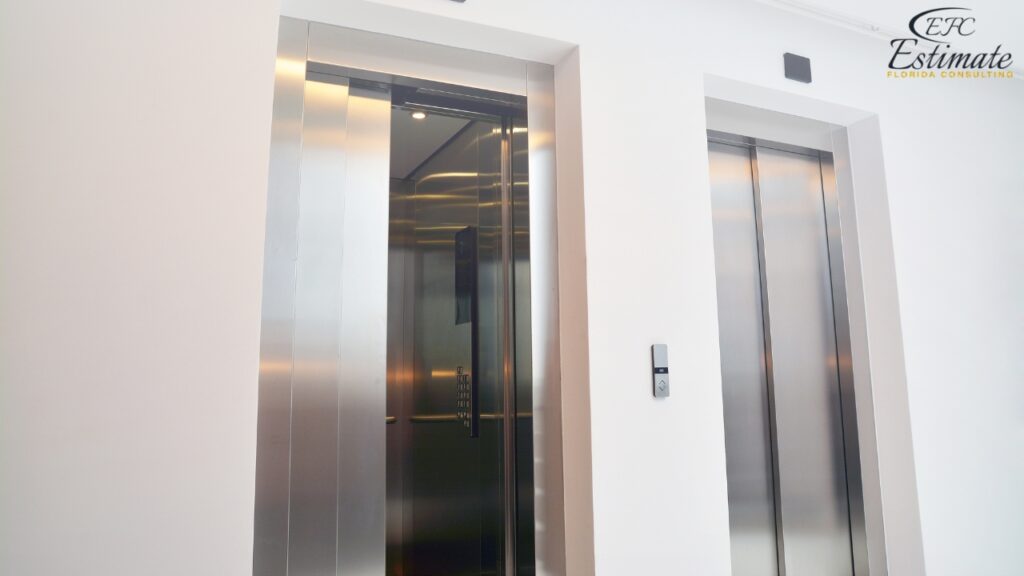
An elevator can transform a building by making it more attractive to a wider range of potential tenants, including seniors and individuals with disabilities, thereby increasing its marketability.
How Much Does an Elevator Installation Cost?
The cost of installing an elevator in a multi-family building can vary significantly based on several factors, including the type of elevator, building height, and specific installation requirements. On average, the cost ranges from $45,500 to $130,000 per elevator, but this can fluctuate based on specific project needs and local regulations. Factors such as the number of floors, the need for structural modifications, and the choice of finishes all contribute to the overall expense. An elevator installation not only enhances accessibility but also improves the building’s marketability by appealing to a broader range of potential tenants, including those with mobility challenges. Additionally, elevators can improve a building’s compliance with accessibility standards, making them a valuable asset for attracting tenants. This investment also supports a community-focused living environment, demonstrating a commitment to accessibility and modern amenities.
Average Cost of an Elevator Installation
The average cost of elevator installation typically falls between $65,000 and $97,500. This estimate includes the elevator equipment, installation fees, and necessary modifications to the building structure. Costs can be influenced by the complexity of the building’s architecture, the quality of materials used, and the specific type of elevator chosen. Factors such as the number of floors, building layout, and choice of elevator system can affect the total cost. Investing in an elevator can significantly increase the property’s value and appeal, making it a worthwhile consideration for multi-family buildings seeking to enhance amenities and tenant satisfaction. Moreover, elevators can lead to increased rental income by justifying higher rent prices due to improved building features. They also help in retaining tenants, as residents are more likely to stay in a building that provides modern conveniences and accessibility.
Elevator Installation Cost by System Type for Multi-Family Buildings
The choice of elevator system significantly impacts installation costs. Each system type offers varying benefits in terms of performance, energy efficiency, and maintenance requirements. Here’s a breakdown of costs by system type:
Hydraulic Elevators
Typically the least expensive option, hydraulic elevators are suitable for low-rise buildings and offer reliable performance with straightforward maintenance. They use a piston and fluid system to move the elevator car, providing smooth and quiet operation. Hydraulic systems are known for their durability and simplicity, making them a popular choice for smaller buildings. However, they may not be as energy-efficient as traction systems and are generally slower, making them more suitable for buildings with fewer floors.
Traction Elevators
More expensive but ideal for mid to high-rise buildings, traction elevators offer faster speeds and higher capacities. They use ropes and counterweights, making them more energy-efficient and capable of serving taller buildings. Traction elevators are often favored in urban settings where speed and efficiency are paramount. These elevators can handle more passengers and are generally quieter than hydraulic elevators, making them suitable for busy residential buildings.
Machine-Room-Less (MRL) Elevators
Offer a compact design with reduced space requirements, often resulting in lower construction costs. MRL elevators are ideal for buildings where space is a premium, providing a balance between cost and functionality. They eliminate the need for a separate machine room, saving valuable space within the building. MRL elevators are energy-efficient and can be installed in existing shafts, making them a flexible choice for renovations and new constructions alike.
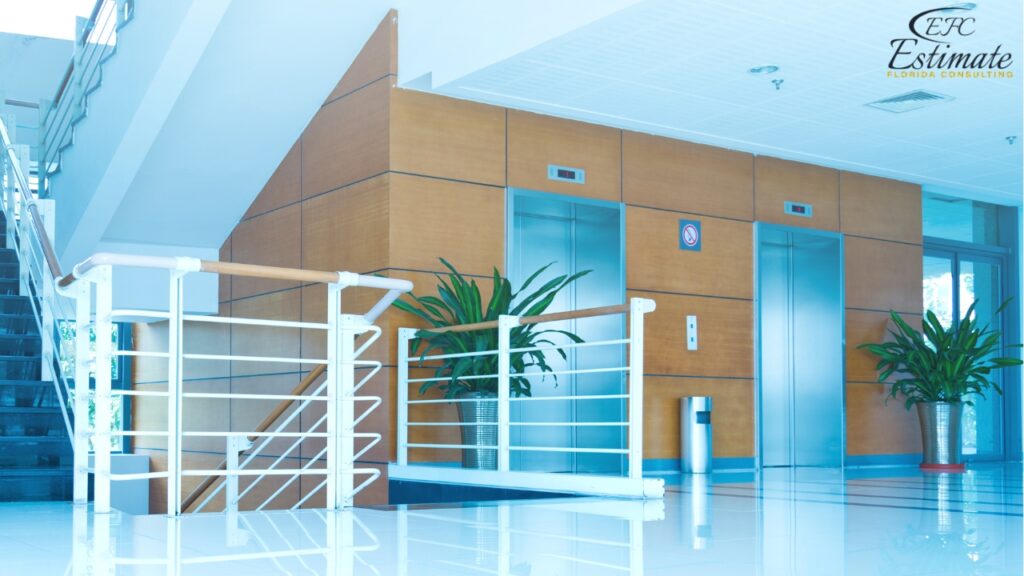
System Type | Estimated Cost per Elevator |
Hydraulic | $45,500 – $65,000 |
Traction | $65,000 – $104,000 |
Machine-Room-Less | $78,000 – $130,000 |
Elevator Installation Cost by Building Height for Multi-Family Buildings
The height of the building significantly influences the cost of elevator installation. Taller buildings require more advanced systems and additional safety measures, increasing the overall cost. The choice of elevator system and customization options can also vary depending on the height and architectural design of the building. Elevators in high-rise buildings must be designed to handle frequent use and higher capacities, necessitating more robust systems. The installation process for taller buildings is often more complex, requiring careful coordination and planning to ensure safety and efficiency.
Low-Rise (1-3 floors)
Typically require hydraulic systems, focusing on cost-effective solutions for shorter travel distances. These buildings can benefit from basic systems that prioritize durability and functionality over speed. Low-rise buildings often have simpler elevator requirements, allowing for a focus on affordability and reliability.
Mid-Rise (4-10 floors)
Often use traction systems to provide faster service and greater efficiency for moderate heights. Mid-rise buildings benefit from elevators that balance speed with energy efficiency, catering to moderate traffic levels. These elevators are designed to handle a steady flow of passengers and are often equipped with features that enhance performance and reduce wait times.
High-Rise (11+ floors)
Require high-speed traction systems to ensure efficient vertical transportation in tall structures. High-rise elevators must be equipped with advanced features to handle high traffic volumes and provide a comfortable experience for residents. These elevators often include sophisticated control systems to manage flow and ensure safety, making them suitable for bustling urban environments where efficiency and reliability are crucial.
Building Height | Estimated Cost per Elevator |
Low-Rise | $45,500 – $65,000 |
Mid-Rise | $65,000 – $97,500 |
High-Rise | $97,500 – $130,000+ |
Elevator Installation Costs by Elevator Type for Multi-Family Buildings
Different elevator types have varying costs based on their complexity and functionality. Each type offers unique benefits and challenges, influencing the overall installation budget. Understanding the specific needs of your building and the type of traffic it experiences will help you choose the right type of elevator for your project.
Passenger Elevators
Designed for transporting people, with options ranging from basic to luxurious features. Passenger elevators are the most common type and are available in a variety of styles to suit different building needs. They can be customized with various finishes and cabin designs to enhance the aesthetic appeal. Passenger elevators are essential for multi-family buildings to provide safe and reliable transportation for residents, increasing the overall desirability of the property.
90% More Chances to Win Projects With Our Estimate!
- Multi-Family Building
- Hotel Building
- Hospital Building
- Warehouse Building
- School & University Building
- High-Rise Building
- Shopping Complex
- Data Center Building
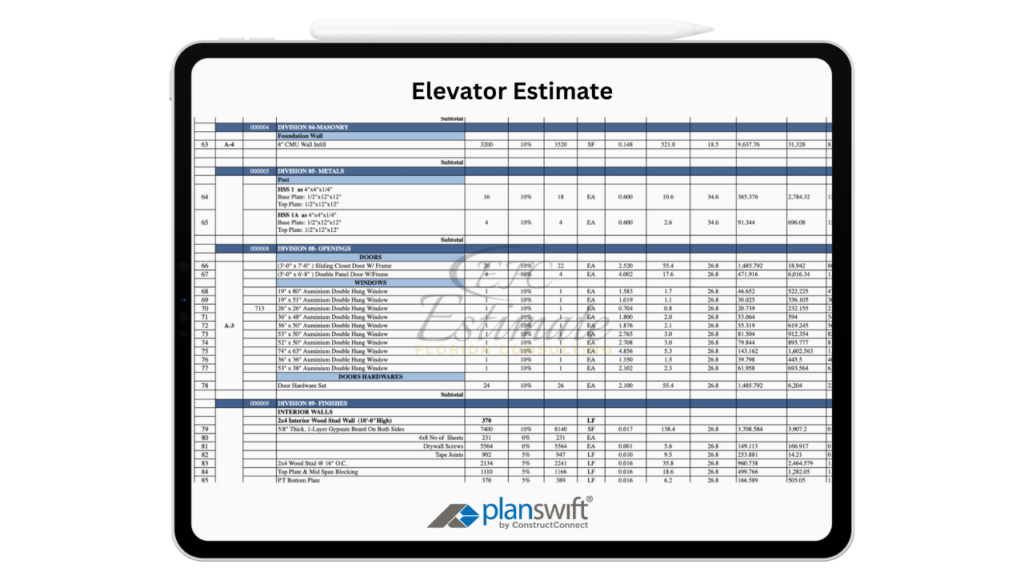
Freight Elevators
Built to carry heavy loads, often used in buildings that require regular movement of goods and materials. Freight elevators are more robust and may include reinforced structures to handle increased weight. They are essential for buildings with high-volume traffic or specific logistical needs. Freight elevators are crucial in buildings with commercial operations or heavy-duty needs, such as apartment complexes with on-site maintenance facilities or service areas.
Service Elevators
Similar to passenger elevators but designed for utility purposes, often used by building staff and maintenance personnel. Service elevators may be installed in back-of-house areas to ensure efficient building operations. They are crucial for managing maintenance tasks and providing access for staff without disrupting resident access. Service elevators enhance operational efficiency by allowing staff to move between floors without interfering with resident elevator access, ensuring smooth building operations.
Elevator Type | Estimated Cost per Elevator |
Passenger | $52,000 – $104,000 |
Freight | $78,000 – $130,000 |
Service | $65,000 – $110,500 |
Elevator Installation Cost by Brand for Multi-Family Buildings
The brand of the elevator can also influence costs, with premium brands typically commanding higher prices due to their reputation and quality. Each brand offers different features and warranties that can impact the overall value of the investment. Selecting a reputable brand ensures reliability, safety, and long-term performance. Understanding the strengths of each brand will help you choose an elevator system that aligns with your building’s needs and budget.
Otis
Known for innovative technology and reliable performance, offering a range of elevators for various building types. Otis elevators are renowned for their smooth operation and advanced safety features, making them a preferred choice for many high-end properties. Otis is a leader in the elevator industry, known for its commitment to safety and technology-driven solutions, ensuring reliable performance in a variety of settings.
Schindler
Offers energy-efficient solutions with a focus on sustainability and design flexibility. Schindler elevators are designed to minimize environmental impact while delivering superior performance and aesthetics. Schindler emphasizes sustainable development, providing elevators that integrate seamlessly into green buildings and contribute to a reduced carbon footprint.
KONE
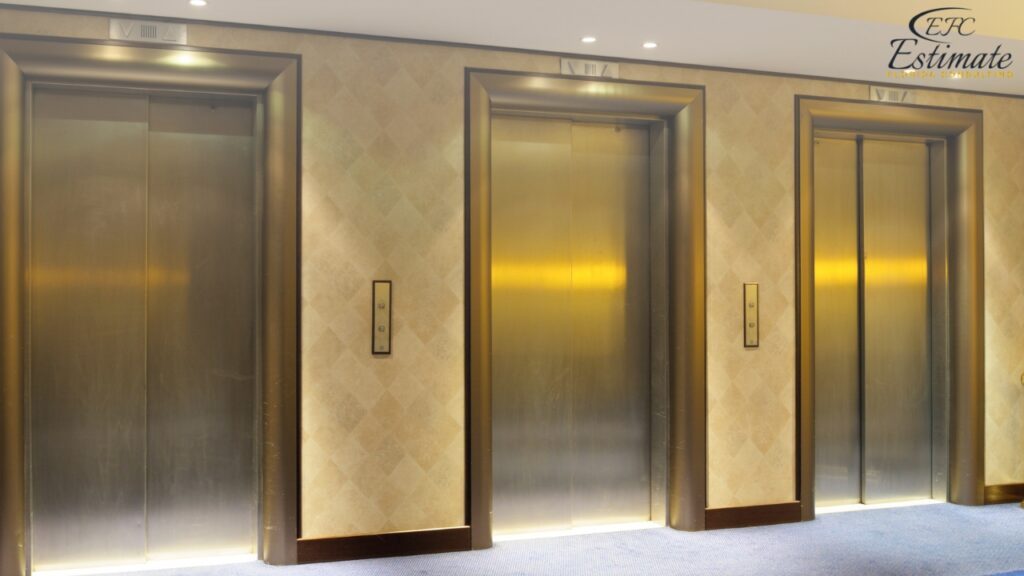
Provides innovative designs and eco-friendly options, focusing on efficiency and user experience. KONE elevators are known for their advanced technology and customizable designs, making them suitable for both residential and commercial applications. KONE is recognized for its dedication to innovation, offering smart solutions that enhance the user experience and optimize energy efficiency.
ThyssenKrupp
Specializes in high-performance elevators with advanced safety features and customizable options. ThyssenKrupp elevators are engineered for precision and durability, providing robust solutions for the most demanding environments. ThyssenKrupp’s elevators are built to handle high traffic volumes with efficiency and reliability, making them ideal for large-scale residential and commercial properties.
Mitsubishi Electric
Offers high-quality elevators with a reputation for smooth operation and durability. Mitsubishi Electric elevators are designed to provide a seamless user experience, with a focus on safety and comfort. Mitsubishi Electric is renowned for its high standards of engineering excellence, delivering elevators that combine functionality, reliability, and aesthetics for a superior building experience.
Brand | Estimated Cost per Elevator |
Otis | $65,000 – $130,000 |
Schindler | $58,500 – $117,000 |
KONE | $65,000 – $123,500 |
ThyssenKrupp | $71,500 – $130,000 |
Mitsubishi Electric | $78,000 – $143,000 |
Energy-Efficient Elevator Installation Costs
Energy-efficient elevators may have a higher upfront cost but offer long-term savings through reduced energy consumption. These systems are designed to minimize electricity use and improve the building’s overall sustainability. By investing in energy-efficient elevators, property owners can achieve significant savings on energy bills and contribute to environmental conservation. These elevators often include regenerative drives that capture energy generated during braking and feed it back into the building’s electrical system, reducing overall power usage.
- Cost Range: $78,000 – $156,000
Feature | Description |
Energy Savings | Up to 50% reduction in energy use |
Sustainability | Enhanced building efficiency |
Incentives | Possible tax credits and rebates |
Whole Building Elevator Installation Cost for Multi-Family Buildings
Installing elevators throughout an entire multi-family building involves scaling costs based on the number of units and floors. For a building with 20 units and three floors, the total cost can vary significantly depending on the chosen systems and features. This large-scale installation requires careful planning and coordination to ensure that all elevators are installed efficiently and within budget. Consideration must be given to the building’s architectural layout, existing infrastructure, and tenant needs to determine the most appropriate elevator system.
- Estimated Total Cost Range: $520,000 – $1,300,000+
This cost includes not only the installation of the elevators themselves but also any structural changes needed to accommodate them, such as shaft construction or modifications to meet code requirements. Additionally, the cost will cover associated expenses such as electrical upgrades, safety inspections, and certification fees to ensure compliance with local building codes and regulations.
Get Acquainted with Elevator
Labor Costs for Elevator Installation in Multi-Family Buildings
Labor costs are a significant component of the total expense of elevator installation, as skilled technicians are required to ensure the system is safely and correctly installed. The complexity of the building, the elevator system chosen, and the local labor market can all impact labor costs. Hiring experienced professionals ensures the installation process adheres to all safety standards and minimizes future maintenance issues. Labor costs may also include fees for project management and oversight to ensure that the installation is completed on schedule and to specification.
Labor Type | Estimated Cost per Elevator |
Basic Installation | $15,600 – $23,400 |
Complex Installation | $26,000 – $39,000 |
Custom Work | $31,200 – $46,800 |
Elevator Installation Cost Factors in Multi-Family Buildings
Several factors influence the overall cost of installing an elevator in a multi-family building:
- Building Design: The architectural design and layout can affect the complexity of installation, with more intricate designs requiring additional modifications and labor.
- Customization: Custom features, such as unique cabin designs or advanced control systems, can increase costs.
- Regulatory Compliance: Meeting building codes and regulations may require additional upgrades or modifications, impacting costs.
- Maintenance and Warranties: Long-term maintenance plans and extended warranties can add to initial costs but provide peace of mind and reduce future expenses.
Understanding these factors helps property managers and owners plan their budgets effectively and make informed decisions about the best elevator solutions for their buildings.
Additional Costs and Considerations for Elevator Installation
When planning an elevator installation project, consider additional costs such as:
- Permits and Inspections: Required for larger projects, adding to overall expenses.
- Disposal Fees: Old elevators may incur disposal fees, typically around $5,200 – $10,400.
- Upgrades: Enhancements like smart controls or improved safety features may increase costs but add significant value.
By considering these additional costs, property managers can ensure a comprehensive budget that covers all aspects of the elevator installation process, minimizing unexpected expenses and ensuring a smooth project execution.
How to Save Money on Elevator Installation
Here are some tips to save money on elevator installation without compromising quality:
- Bulk Discounts: Installing multiple elevators at once can reduce per-elevator costs.
- Off-Peak Installation: Schedule installation during slower construction periods for potential savings.
- Energy Efficiency Rebates: Check for local incentives or rebates for energy-efficient upgrades.
- Pre-Owned Options: Consider refurbished elevators for cost savings while maintaining quality.
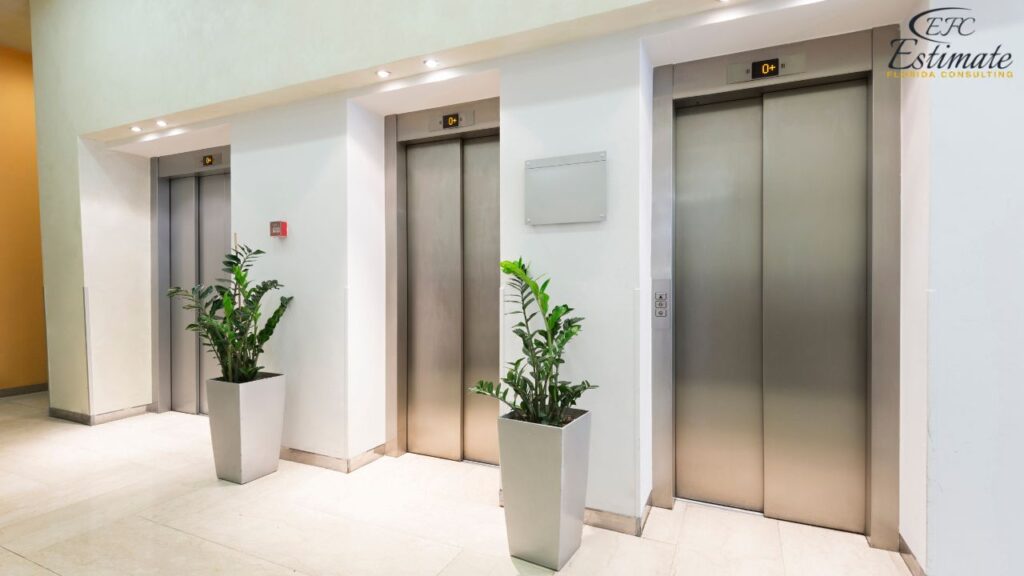
How Florida Consulting Can Help You Estimate and Plan Elevator Installation?
At Florida Consulting, we specialize in providing detailed construction estimates and planning services for multi-family building projects, including elevator installations. Our team of experts can help you navigate the complexities of such projects, from selecting the right elevator system to ensuring your project complies with all local codes and regulations. Here’s how we can assist:
Comprehensive Site Assessments
At Florida Consulting, we begin every elevator installation project with a thorough site assessment to determine the feasibility of the installation and to identify any potential challenges that may arise during the process. This assessment involves evaluating the existing infrastructure of the building, including its structural integrity, layout, and space availability. We consider how the elevator will fit into the current architecture, ensuring that the shaft, machinery, and other components can be properly accommodated without compromising the building’s stability or design. Additionally, our team examines the number of floors, entry points, and traffic patterns to ensure the elevator system we recommend meets the specific needs of the building and its occupants. We also assess factors such as electrical requirements, ventilation, and fire safety, all of which play a critical role in determining the overall cost and complexity of the project. By conducting a comprehensive site assessment upfront, we provide property owners with a clear understanding of the project scope and help prevent costly surprises down the line.
Custom Material Selection Advice
Choosing the right elevator system is not a one-size-fits-all decision, which is why Florida Consulting offers customized material selection advice tailored to your building’s unique needs. We consider several factors when helping you select the most appropriate elevator, including your budget, the size of the building, and the anticipated frequency of elevator use. Whether you need a basic hydraulic system for a low-rise building or a more advanced traction or machine-room-less (MRL) elevator for a taller, high-traffic property, we guide you through the decision-making process. We also help you evaluate long-term maintenance and operational costs, ensuring you choose an elevator system that offers the best balance of performance, durability, and affordability. Our team provides insights into the latest technology and energy-efficient options, helping you select systems that not only meet today’s building code requirements but also future-proof your investment. With Florida Consulting’s expert advice, you can make informed decisions that enhance the functionality and value of your property.
Permitting Assistance
Navigating the permitting process for elevator installation can be complex and time-consuming, but at Florida Consulting, we handle this aspect of the project for you. Each jurisdiction has its own set of building codes, safety regulations, and ADA (Americans with Disabilities Act) compliance requirements that must be adhered to, and failing to meet these standards can lead to costly delays or even fines. Our team is experienced in securing the necessary permits and ensuring that all paperwork is completed correctly and submitted on time. We work closely with local building authorities to facilitate inspections and approvals, making sure your project progresses smoothly and without unnecessary interruptions. Additionally, we stay up-to-date on any changes in state and local codes, so you can be confident that your elevator installation will meet the latest safety and accessibility requirements. With our permitting assistance, you can rest assured that the legal and regulatory aspects of your elevator installation are handled efficiently, allowing you to focus on the broader aspects of your project.
Download Template For Elevator Project Breakdown
- Materials list updated to the zip code
- Fast delivery
- Data base of general contractors and sub-contractors
- Local estimators

Accurate Labor and Material Estimates
One of the most critical components of a successful elevator installation is having a clear and accurate understanding of the costs involved. At Florida Consulting, we specialize in providing detailed, accurate labor and material estimates that allow you to plan and budget for your project with confidence. Our team takes into account all aspects of the installation process, from the elevator equipment and construction materials needed to the labor costs for skilled technicians and subcontractors. We also factor in additional costs that might arise, such as structural modifications, electrical upgrades, or special finishes that may be required to complete the project. By breaking down the costs line by line, we ensure that there are no hidden expenses or unexpected overruns. Our estimates are based on years of industry experience and in-depth knowledge of current market rates, ensuring that you receive competitive pricing while maintaining the highest standards of quality. With our precise labor and material estimates, you can proceed with your elevator installation fully informed, knowing that the project will be completed on time and within budget.
Conclusion
Installing an elevator in a multi-family building is a significant investment that enhances accessibility, property value, and tenant satisfaction. At Estimate Florida Consulting, we offer precise estimates to guide you through the financial planning of your elevator installation project. Understanding the costs associated with different elevator types, building heights, and customization options is crucial for making informed decisions. On average, costs can range from $45,500 to $130,000 per elevator, influenced by factors such as building structure and specific installation needs. Investing in an elevator not only improves accessibility and compliance with ADA standards but also enhances marketability by appealing to a broader tenant base, including seniors and those with disabilities, thereby increasing the building’s desirability and long-term value.
FAQs
Installing an elevator in a multi-family building enhances accessibility, increases property value, and improves convenience for residents. It also ensures compliance with ADA standards, making the building more attractive to a broader range of potential tenants, including seniors and individuals with disabilities.
The cost of installing an elevator can vary significantly based on several factors, including the type of elevator, building height, and specific installation requirements. On average, costs range from $45,500 to $130,000 per elevator.
The average cost of elevator installation typically falls between $65,000 and $97,500. This includes elevator equipment, installation fees, and necessary modifications to the building structure.
Different elevator systems have varying costs and benefits:
- Hydraulic Elevators are cost-effective and suitable for low-rise buildings, costing $45,500 to $65,000.
- Traction Elevators are more expensive, ideal for mid to high-rise buildings, costing $65,000 to $104,000.
- Machine-Room-Less (MRL) Elevators offer space-saving designs, costing $78,000 to $130,000.
Building height influences installation costs:
- Low-Rise (1-3 floors): $45,500 – $65,000
- Mid-Rise (4-10 floors): $65,000 – $97,500
- High-Rise (11+ floors): $97,500 – $130,000+
Taller buildings require more advanced systems, increasing costs.
Different elevator types have varying costs:
- Passenger Elevators: $52,000 – $104,000
- Freight Elevators: $78,000 – $130,000
- Service Elevators: $65,000 – $110,500
Each type serves different purposes and has unique cost implications.
The brand influences costs, with premium brands commanding higher prices:
- Otis: $65,000 – $130,000
- Schindler: $58,500 – $117,000
- KONE: $65,000 – $123,500
- ThyssenKrupp: $71,500 – $130,000
- Mitsubishi Electric: $78,000 – $143,000
Brands offer different features and warranties that impact value.
Google Reviews



Process To Get a Multi-Family Building Elevator Installation Estimate Report
Here I am going to share some steps to get a multi-family building elevator installation estimate report.
-
You need to send your plan to us.
You can send us your plan on info@estimatorflorida.com
-
You receive a quote for your project.
Before starting your project, we send you a quote for your service. That quote will have detailed information about your project. Here you will get information about the size, difficulty, complexity and bid date when determining pricing.
-
Get Estimate Report
Our team will takeoff and estimate your project. When we deliver you’ll receive a PDF and an Excel file of your estimate. We can also offer construction lead generation services for the jobs you’d like to pursue further.

